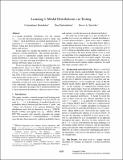Learning k-modal distributions via testing
Author(s)
Daskalakis, Constantinos; Diakonikolas, Ilias; Servedio, Rocco A.
DownloadDaskalakis-Learning k-modal.pdf (294.5Kb)
PUBLISHER_POLICY
Publisher Policy
Article is made available in accordance with the publisher's policy and may be subject to US copyright law. Please refer to the publisher's site for terms of use.
Terms of use
Metadata
Show full item recordAbstract
A k-modal probability distribution over the domain {1,..., n} is one whose histogram has at most k "peaks" and "valleys." Such distributions are natural generalizations of monotone (k = 0) and unimodal (k = 1) probability distributions, which have been intensively studied in probability theory and statistics.
In this paper we consider the problem of learning an unknown k-modal distribution. The learning algorithm is given access to independent samples drawn from the k-modal distribution p, and must output a hypothesis distribution p such that with high probability the total variation distance between p and p is at most ε.
We give an efficient algorithm for this problem that runs in time poly(k, log(n), 1/ε). For k ≤ Õ(√ log n), the number of samples used by our algorithm is very close (within an Õ(log(1/ε)) factor) to being information-theoretically optimal. Prior to this work computationally efficient algorithms were known only for the cases k = 0, 1 [Bir87b, Bir97].
A novel feature of our approach is that our learning algorithm crucially uses a new property testing algorithm as a key subroutine. The learning algorithm uses the property tester to efficiently decompose the k-modal distribution into k (near)-monotone distributions, which are easier to learn.
Date issued
2012Department
Massachusetts Institute of Technology. Department of Electrical Engineering and Computer ScienceJournal
Proceedings of the Twenty-Third Annual ACM-SIAM Symposium on Discrete Algorithms (SODA '12)
Publisher
Society for Industrial and Applied Mathematics
Citation
Constantinos Daskalakis, Ilias Diakonikolas, and Rocco A. Servedio. 2012. "Learning k-modal distributions via testing." In Proceedings of the Twenty-Third Annual ACM-SIAM Symposium on Discrete Algorithms (SODA '12). SIAM 1371-1385. SIAM ©2012
Version: Final published version